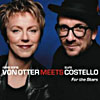
This Week: Don't let Elvis Costello test your faith, find the Red House Painter's lost gem, hear Monster Magnet recycle the glory of classic rock and metal, and mourn the death of a jazz pianist
Elvis Costello & Anne Sophie von Otter

For the Stars (Deutsche Grammophon)
In Catholicism there's this thing, this phantasmal belief called transmogrification, wherein the little round communion host is blessed and—in the greatest leap of faith—actually becomes the embodiment of Christ.
Transmogrification is a doctrine that digs down into the deepest and murkiest nadirs of human belief. For an undying, foolhardy Elvis Costello fan, such dogmatic faith, although a necessity, can be a terrible curse. Costello Catholicism we'll call it, the unabashed belief that, regardless of the many missteps along the way, Elvis is an unparalleled King.
For the Stars, Costello's collaboration with mezzo-soprano classicist Anne Sophie von Otter, has, however, shaken such faith to its frayed core. Sure, von Otter's is a beautiful voice. I'll even give you that the arrangements here are exceptional. But I won't back down on the fact that Elvis Costello's name and mug have no right gracing the cover of this platter (consumer fraud of the highest degree—he does nothing more than arrange and toss a short vocal in here and there). Nor will I sit back and accept mindless critical adoration of the abuse this disc puts to one of pop history's most gentle and touching songs, Brain Wilson's "Don't Talk (Put Your Head on my Shoulder)." In fact, this whole mess just sounds like medieval chamber racket. The kind that probably would've found serf von Otter cuddling the King while court jester Costello got sent off to his demise.
Costello's has been a long and varied career filled with genius and stupidity, but it has always been his genius or stupidity—his voice. Now we have his idea transmogrified—an unlovable misstep of the worse kind because now he's placed his fool's target on someone other than himself. Von Otter obviously has her talents and Costello has his, but this isn't an earnest assessment of either; it's just a soul-bending indulgence that quite frankly sounds silly. Maybe Martin Luther had the right idea after all.
—Kurt Hernon
Red House Painters

Old Ramon (Sub Pop)
Mark Kozelek and the Red House Painters actually recorded their latest album, Old Ramon, in 1997 and 1998. Due to protracted label difficulties, though, the record sat unreleased, gradually acquiring a lost-minor-classic status among fans.
Few records could live up to the expectations that built, and Old Ramon isn't, by any stretch, an instant classic. But it is a striking record, melancholy and romantic, with flashes of pop brilliance and a personal warmth formerly unheard from Kozelek.
Like the opening track, "Wop-A-Din-Din," an acoustic love song about Kozelek's cat that swerves clear of whimsy with the nearly heartbreaking sincerity of the line, "When we lock eyes there's so much love I want to cry." Or "Byrd Joel," where folky strumming is overcome by a wash of emotive, impressionistic electric guitar. Or the '70s pop vibe of "Between Days," which also highlights Kozelek's emotive singing and his gift of lyrical detail with images like "ancient highways, desert dust, diamonded sky."
Kozelek's familiar, self-lacerating introspection hasn't completely disappeared. He's still obsessed with the past and lost love, but the tone of Old Ramon is more wistful than rueful, and the performances have matured into a graceful blend of electric guitars and country-ish folk. The album even ends on a happy note, with the pleasant, homey love song "Kavita," a fitting and comfortable conclusion to a record that already sounds like it's worn in just right.
—Matthew T. Everett
Monster Magnet

God Says No (A&M)
Much the same as any other putative "art" form, rock 'n' roll must ultimately feed on the carrion of its past in order to generate the fresh tendrils of its future. But whereas so-called "high-brow" creative endeavors offer a diverse wealth of forms and functions to plunder, pop culture's homely brood must suckle at the barren teat of simplicity; the basic I-IV-V chordal template and its attendant guitar-bass-drums vernacular can only be rearranged and deconstructed so many times before the formula begins to sound rote.
But while so many other modern rock denizens dip from the same well time and again, long-running reefer-rockers Monster Magnet manage to recombine the most criminally underappreciated elements of the hesher canon in forging a decidedly retro rock species that manages to be fresher and more cathartic than anything else going on the heavier side of popular music today. The orgasmic fuzz-rock of the Stooges and MC5, the florid posturing and bombast of classic art-rockers, the plodding grandeur and comic-book creepiness of Black Sabbath and Blue Cheer—this is the stuff of Monster Magnet's realm, a surrealistic, sonically dense universe where no concept is too lofty or fanciful, no musical gesture too melodramatic or brash.
God Says No, the band's fifth full-length album, combines the trippy experimentation of its early Caroline Records releases with the turbo-charged Big Rock of its subsequent major label outings. You'd be hard-pressed to find a more impactful one-two-three combination than the opening troika of "Melt," "Heads Explode," and "Doomsday," while bluesy change-up cuts like "Gravity Well" provide bong-loading respites from all the fuzz-tone sturm and drang.
God does drag in spots, chiefly through the mid-album section. But by the time singer/guitarist/head Monster Dave Wyndorf belts out the last defiant syllables of "Silver Future," the fist-pumping "bonus track," this reviewer was already cranking the volume another notch and making a beeline for "repeat."
—Mike Gibson
John Lewis

evolution II (Atlantic)
Born in 1920, John Lewis came to prominence in the bop era, a coeval of pianists Bud Powell and Thelonious Monk. But Lewis is hardly representative of the pianists of that heady time, eschewing Powell's right-hand embroidery and Monk's quirky clusters for a more discreet style, preoccupied with European classical influences.
Lewis, who died on March 29, created a welcome contrast to the flood of notes so characteristic of piano jazz.
Jazz critic Nat Hentoff once remarked that Lewis was "one of the truest, most regenerating blues pianists of this jazz era." Today, Lewis is best known for his membership in the longest-lived jazz quartet in history, the Modern Jazz Quartet, an institution more often promoted for its classical elements than its blues foundation. In the context of MJQ and Lewis' leanings, Hentoff's stating of the obvious is anything but.
Evolution II abides in that reserved blues and classical geography Lewis made his own. Following 1999's solo piano effort evolution, this release consists of piano, bass, guitar, and drum quartets. The instrumentation aside, however, evolution II is much like its predecessor, a Lewis affair, the piano the feature, all else mere accompaniment.
Among the mostly Lewis originals on the CD, "December, Remember" stands out as the most idiosyncratic of Lewis tunes, both in style and composition. The three-minute piano introduction, performed outside time, is distinctively spare, a chamber solo, with contrapuntal lines interweaving though the descending thematic phrase. Following which bass, guitar, and drums join to transform the tune into a swinging blues, walking bass lines backing Lewis' blue note accumulations.
As for Lewis' solos throughout this recording, they are devoid of the rhapsodic (no Keith Jarrett-like forays here, despite the shared Bach interests), rather focusing inside the harmonic structure, his left hand often providing a polyphonic foil to the right. Lewis' fugue of influences and tasteful employment of space and silence present a welcome refuge.
—Jonathan B. Frey

May 17, 2001 * Vol. 11, No. 20
© 2001 Metro Pulse
|